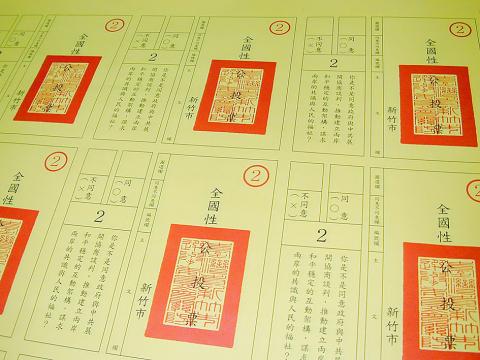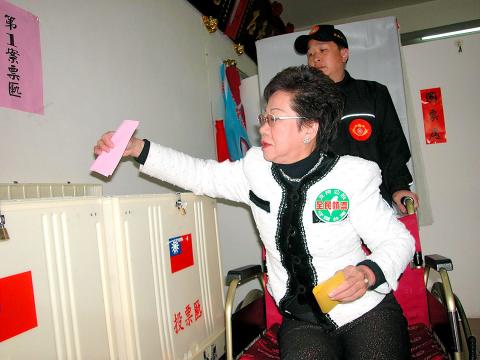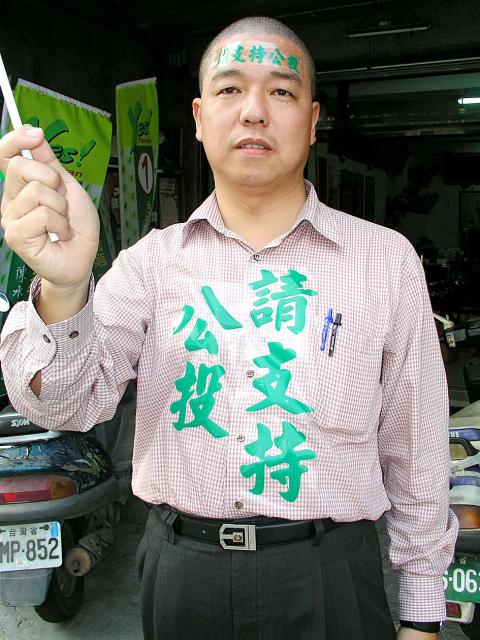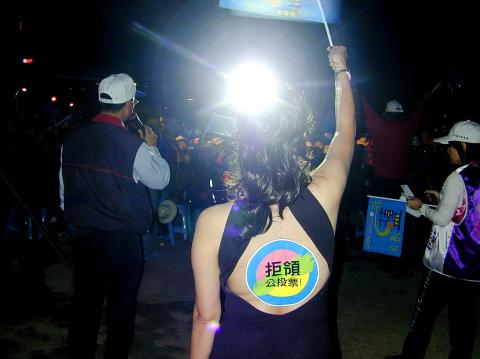Dec. 3 to Dec. 9
Under today’s relaxed rules, the two questions in Taiwan’s first national referendum in March 2004 would have passed overwhelmingly. The referendum came at a sensitive time, with then-president Chen Shui-bian (陳水扁) running for reelection and Beijing watching closely.
The two questions were:

Photo: Chen Wei-jen, Taipei Times
“The People of Taiwan demand that the Taiwan Strait issue be resolved through peaceful means. Should Mainland China refuse to withdraw the missiles it has targeted at Taiwan and to openly renounce the use of force against us, would you agree that the Government should acquire more advanced anti-missile weapons to strengthen Taiwan’s self-defense capabilities?”
“Would you agree that our Government should engage in negotiation with Mainland China on the establishment of a ‘peace and stability’ framework for cross-strait interactions in order to build consensus and for the welfare of the peoples on both sides?”
Over 90 percent of the roughly 7 million votes were in favor of both questions. However, a voter turnout of 50 percent was required back then for a referendum to pass. Both questions fell just short at just over 45 percent.

Photo: Hsu Hui-ling, Taipei Times
The questions were toned-down versions of Chen’s earlier rhetoric demanding that China immediately withdraw all ballistic missiles aimed at Taiwan and openly renounce the use of force.
The US was pleased with the revised questions but “stopped short of explicitly endorsing the new phrasing... which [was] still likely to upset the Chinese,” reported the New York Times.
Chen, then-chairman of the Democratic Progressive Party (DPP), was also dealing with domestic pressures. His opponents had been opposed to the referendums since the DPP introduced the first draft of the Referendum Act in July 2003.

Photo: Chang Hsieh-sheng, Taipei Times
CAUGHT IN A BIRDCAGE
National referendums are a relatively modern invention. There were only 73 recorded national referendums before 1900, with none in Asia. Only 12 countries provided for national referendums until the 1940s, when the number began to grow steadily before shooting up in the 1990s.
As early as 1947, in the aftermath of the 228 Incident — an anti-government uprising that was brutally suppressed — writer and businessman Chiu Yung-han (邱永漢) petitioned the UN to allow Taiwanese to decide the future of Taiwan through a national referendum. This did not happen due to the Chinese Nationalist Party’s (KMT) authoritarian rule and Chiang Kai-shek’s (蔣介石) insistence that Taiwan was a part of China.

Photo: Chen Wei-jen, Taipei Times
Between 1990 and 2003, 16 local referendums were held, but none at the national level.
In the years leading up to the Referendum Act, Chen mentioned national referendums several times — first, with reference to the future of the Fourth Nuclear Power Plant; then in 2002, in support of legislation authorizing a referendum to declare Taiwanese independence. Lawmakers began to draft a bill in March 2003, but the DPP was not happy with the version that Chen’s cabinet approved, which excluded referendums on independence and national security.
Chen again called for a national referendum in May 2003 after Taiwan’s failed bid to join the WHO, but it did not take place because there was no legislation. By July, the DPP unveiled a draft bill that would authorize the president to initiate a referendum on “issues pertinent to national security if Taiwan were threatened by foreign powers such that its sovereignty could be altered.” This came to be known as the “defensive” referendum clause.
The KMT and People First Party (PFP), which together dominated the legislature, were strongly opposed to the bill and ended up proposing their own draft.
The final “watered-down” bill made it almost impossible to hold referendums for independence or constitutional changes, and banned referendums to draft a new constitution. The bar was set so high that the bill came to be dubbed the “birdcage” referendum act. This was still a common term when thresholds were relaxed last December.
‘PEACE’ REFERENDUM
Nevertheless, the “defensive” referendum clause was kept in the final bill. Chen would invoke this clause, saying that China’s missiles aimed at Taiwan constituted a national security threat. Critics, including the White House, maintained that he was using the referendum to further his bid for reelection the following year. Unsurprisingly, Beijing was furious, and the US warned Chen to keep his rhetoric in check.
After several delays, Chen announced the final questions on Jan. 17, 2004 and set the date for the presidential elections on March 20. A series of 10 debates between major politicians were held between Feb. 29 and March 14.
Chen’s pan-blue opponents were actually in favor of the referendum proposals, but then-KMT chairman Lien Chan (連戰), declared the concept of referendums “illegal and meaningless” and urged supporters not to vote, hoping that the referendum would fall below the 50 percent voter turnout threshold.
Lien summed up his position during the second presidential election debate on Feb. 21, 2004, saying, “I respect the people’s right to vote on the referendum, but for me, it is an illegal and controversial referendum. I certainly won’t cast my vote on it and I suggest Mr Chen immediately stop it.”
This became a contentious battle leading up to the elections. Supporters from both camps showed their stances through stickers, signs, slogans and demonstrations. People attended rallies sporting “Refuse to take the referendum ballot” stickers, while others wore pins that read “Support the national referendums and protect Taiwan.”
The referendums failed, showing that it was possible to derail the vote through a boycott. Due to similarly high thresholds for people to submit petitions for referendums, subsequent questions were party-sponsored, including two questions on transitional justice during the 2008 legislative elections and two on UN membership during the 2008 presidential elections.
None of the first six referendum questions managed to pass the voter turnout threshold. Ultimately, this led to amendments to the Referendum Act last December, which lowered the legal voting age, slashed thresholds for initiating, seconding and passing referendums.
Taiwan in Time, a column about Taiwan’s history that is published every Sunday, spotlights important or interesting events around the nation that have anniversaries this week.

A vaccine to fight dementia? It turns out there may already be one — shots that prevent painful shingles also appear to protect aging brains. A new study found shingles vaccination cut older adults’ risk of developing dementia over the next seven years by 20 percent. The research, published Wednesday in the journal Nature, is part of growing understanding about how many factors influence brain health as we age — and what we can do about it. “It’s a very robust finding,” said lead researcher Pascal Geldsetzer of Stanford University. And “women seem to benefit more,” important as they’re at higher risk of

Eric Finkelstein is a world record junkie. The American’s Guinness World Records include the largest flag mosaic made from table tennis balls, the longest table tennis serve and eating at the most Michelin-starred restaurants in 24 hours in New York. Many would probably share the opinion of Finkelstein’s sister when talking about his records: “You’re a lunatic.” But that’s not stopping him from his next big feat, and this time he is teaming up with his wife, Taiwanese native Jackie Cheng (鄭佳祺): visit and purchase a

Experts say that the devastating earthquake in Myanmar on Friday was likely the strongest to hit the country in decades, with disaster modeling suggesting thousands could be dead. Automatic assessments from the US Geological Survey (USGS) said the shallow 7.7-magnitude quake northwest of the central Myanmar city of Sagaing triggered a red alert for shaking-related fatalities and economic losses. “High casualties and extensive damage are probable and the disaster is likely widespread,” it said, locating the epicentre near the central Myanmar city of Mandalay, home to more than a million people. Myanmar’s ruling junta said on Saturday morning that the number killed had

Mother Nature gives and Mother Nature takes away. When it comes to scenic beauty, Hualien was dealt a winning hand. But one year ago today, a 7.2-magnitude earthquake wrecked the county’s number-one tourist attraction, Taroko Gorge in Taroko National Park. Then, in the second half of last year, two typhoons inflicted further damage and disruption. Not surprisingly, for Hualien’s tourist-focused businesses, the twelve months since the earthquake have been more than dismal. Among those who experienced a precipitous drop in customer count are Sofia Chiu (邱心怡) and Monica Lin (林宸伶), co-founders of Karenko Kitchen, which they describe as a space where they